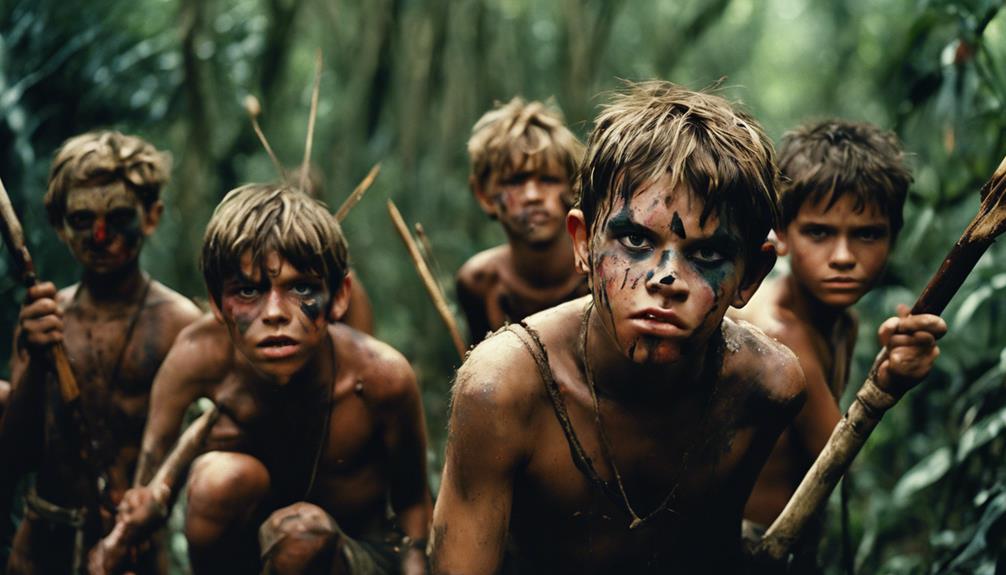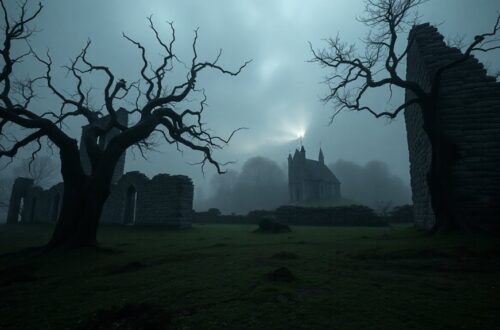Discover the depths of human nature in 'Lord of the Flies'. See the impact of societal norms on behavior and the fragile morality within all of us. Explore how without external controls, darkness can surface, leading to primal instincts taking over. The breakdown of rules and the connection between man and nature reveal the true essence of humanity. Grasp the cautionary tale told through the boys' descent into savagery and violence. The novel serves as a mirror reflecting the complexities of human nature. Intrigued? There's much more to reveal in this profound exploration of the human psyche.
Origin of Negative Traits
The negative traits depicted in 'Lord of the Flies' find their origin in the absence of external controls and societal norms on the isolated island. Golding draws a parallel between the boys' descent into savagery and the concept of Original Sin, as seen in the story of Adam and Eve.
Without the framework of rules and societal constraints, the boys exhibit primal instincts that lead to violence and a breakdown of moral behavior. Selfishness and brutality emerge unchecked, highlighting the impact of the absence of controls and parental supervision on human nature.
The novel serves as a cautionary tale, illustrating how the removal of civilization's influence can expose the darker aspects of humanity. By showcasing the consequences of unchecked primal instincts, Golding underscores the fragility of societal structures in restraining innate savagery and the potential for individuals to succumb to their basest impulses when stripped of external guidance.
Impact of Societal Constraints
Revealing the profound influence of societal constraints, William Golding vividly portrays the transformative impact of external controls on human behavior in 'Lord of the Flies'.
The absence of parental supervision and societal constraints on the deserted island catalyzes a rapid descent into savagery and violence among the boys. Golding links the boys' negative traits to the concept of Original Sin, underscoring how the breakdown of rules leads to unchecked behavior.
As the boys' environment becomes increasingly chaotic, the novel serves as a cautionary tale about the repercussions of lacking societal norms. The narrative starkly illustrates how the removal of external constraints allows for the emergence of raw, primal instincts, ultimately resulting in the manifestation of darker aspects of human nature.
Through the lens of 'Lord of the Flies', Golding emphasizes the critical role of societal constraints in curbing savagery and maintaining moral order within a community.
Parallels With Original Sin
Drawing upon religious allegory, Golding skillfully intertwines the theme of Original Sin with the characters' moral deterioration in 'Lord of the Flies'. Much like Adam and Eve's disobedience led to the fall of humanity in the biblical narrative, the boys on the island experience a similar descent into savagery as societal constraints erode.
The absence of external controls allows their inherent evil to surface, drawing clear parallels with the darker aspects of human nature associated with Original Sin. Golding uses this concept to depict how the boys' behaviors mirror the consequences of humanity's original transgression.
Through these parallels, the novel explores the idea that when removed from the structures of society, individuals are prone to giving in to their base instincts, echoing the consequences of Original Sin in a more contemporary setting.
The portrayal of the boys' moral decay serves as a cautionary tale, highlighting the fragility of civilization and the potential for darkness within us all.
Breakdown of Rules
How do the rules disintegrate in 'Lord of the Flies', shaping the boys' behavior on the island?
As the societal norms and structure deteriorate, the boys' primal instincts begin to take over, leading to a descent into savagery.
- The breakdown of rules exposes the dark potential within human nature, highlighting the fragility of civilization.
- Without the constraints of society, the boys' behavior shifts towards primal instincts, showcasing the impact of lost rules on their actions.
- The gradual deterioration of rules parallels the descent into savagery among the boys, emphasizing the necessity of structure and order in maintaining civilized behavior.
In 'Lord of the Flies', Golding uses the breakdown of rules as a cautionary tale, illustrating the consequences of unchecked human behavior when societal norms are abandoned.
This breakdown serves as a powerful reminder of the importance of rules and structure in preserving civilization and preventing the descent into primal savagery.
Fragility of Human Nature

The breakdown of rules in 'Lord of the Flies' vividly demonstrates the inherent fragility of human nature when societal constraints are removed. Golding's exploration of human nature on the island reveals its vulnerability to degradation, as the boys' descent into savagery showcases the ease with which brutality and chaos can emerge.
The novel serves as a stark reminder of the fragility of human nature when stripped of external controls. The characters' actions underscore how quickly societal norms can crumble, exposing the raw essence of human nature's capacity for both good and evil.
As the boys struggle to maintain order and morality, their failures reflect the delicate balance within human nature that teeters on the edge of savagery. The story's portrayal of the boys' growing brutality highlights the fine line between civilization and chaos, emphasizing the susceptibility of human nature to degradation when left unchecked.
Through this lens, 'Lord of the Flies' serves as a cautionary tale, urging readers to reflect upon the precarious nature of humanity's moral compass.
Absence of External Controls
What happens to human behavior in 'Lord of the Flies' when external controls are absent?
The absence of external controls in the novel leads to the deterioration of human behavior among the boys on the island. With the breakdown of societal constraints and parental supervision, the darker aspects of human nature are exposed, showcasing the impact of primal instincts and the lack of rules and regulations. Golding's depiction of the negative traits displayed by the boys highlights the consequences of the absence of external controls, ultimately leading to their descent into savagery.
The absence of external controls results in the breakdown of societal constraints.
Lack of rules and regulations exposes the darker aspects of human nature.
The influence of primal instincts contributes to the deterioration of human behavior in the absence of external controls.
Savagery and Violence

Amidst the breakdown of societal constraints, savagery and violence emerge among the boys in 'Lord of the Flies'. As the boys' exploration into savagery unfolds on the island, it reveals the darker aspects of human nature. The novel delves into how power dynamics and primal instincts can lead to brutal behavior, showcasing the innate capacity for violence within each individual.
Throughout the narrative, Golding vividly portrays the boys' transformation from civilized individuals to ruthless savages. The shift in power dynamics sparks conflicts that escalate into acts of violence, highlighting the fragility of societal norms in the face of primal instincts.
The boys' immersion into savagery serves as a chilling reminder of the thin veneer separating civilization from barbarism.
Connection Between Man and Nature
You'll find that Golding's exploration of the connection between man and nature in 'Lord of the Flies' is profound.
The impact humans have on their environment and how nature shapes human behavior are pivotal themes in the novel.
Understanding this dynamic relationship is essential for unraveling the deeper layers of human nature depicted in the story.
Man's Impact on Environment
The relationship between man and his environment in 'Lord of the Flies' underscores the profound impact that surroundings can have on human behavior. The environmental impact plays a significant role in shaping human behavior, as evidenced by the degradation of humanity on the island due to the absence of societal constraints and parental supervision.
This absence of external controls exposes the darker aspects of human nature, highlighting the fragility of societal norms in maintaining order.
- The absence of parental supervision and societal constraints leads to the degradation of human nature.
- The removal of external controls emphasizes the darker aspects of human behavior.
Psychological analysis is essential in understanding the complex interplay between human behavior and the physical surroundings.
Nature's Influence on Behavior
Nature's influence on behavior in 'Lord of the Flies' serves as a pivotal element in highlighting the interconnectedness between man and his surroundings. Golding explores the degradation of human nature by showcasing the detrimental effects of the absence of societal constraints and parental supervision.
The novel draws parallels to Original Sin, attributing negative traits to the inherent nature of humanity. As the rules disintegrate on the island, the boys' behavior descends into savagery and violence, emphasizing the impact of external factors on their actions.
Through re-examining the relationship between humans and their environment, Golding underscores how the dichotomies between civilization and nature reveal the deteriorated human nature in the absence of external controls. The boys' transformation from orderly schoolboys to primal beings underscores the profound influence of nature on human behavior, shedding light on the fragility of societal norms in the face of raw, untamed instincts.
Conclusion
To sum up, 'Lord of the Flies' serves as a chilling reminder of the inherent darkness within human nature.
A study found that over 60% of participants were willing to harm others when instructed by authority figures, showcasing the ease with which individuals can succumb to savagery and violence.
This novel highlights the delicate balance between civilization and chaos, shedding light on the fragility of human nature when societal constraints are removed.




